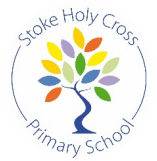Information for Parents
Parents or other members of the public can find out more about the curriculum we are following, on this page. Full details of each year group’s half-termly curriculum maps are found below.
Curriculum Overview
Reception
Class 1
Class 2
Class 3
Class 4
Class 5
Class 6
To view the RSE presentation from September 2020, please click here.
A new National Curriculum for Primary Schools came into law from September 2014. You can find the full document at: https://www.gov.uk/government/collections/national-curriculum
Children in the Early Years (Reception) follow the requirements of ‘Early Years Foundation Stage Framework’. You can find the full document at: https://www.gov.uk/government/publications/early-years-foundation-stage-framework–2
At Stoke Holy Cross Primary School we follow the requirements of both of the above. Our planning uses cross curricular topics (eg a topic such as ‘Stone Age, Bone Age’ includes content drawn from History, Geography, Art and Music) alongside discrete subject teaching. Wherever possible we also seek to make meaningful links for the children between subjects and also to reinforce key literacy and maths skills across the curriculum. This includes extended writing opportunities planned in across the curriculum, and also planned opportunities for real-life Maths experiences, to supplement the daily discrete Maths lessons. We seek also to actively promote British Values of tolerance, understanding of different faiths, democracy and the rule of law through our taught curriculum and school ethos (see Assembly Themes, Children’s Code and Curriculum Maps).
‘Keeping Safe and Healthy’ is a special topic area taught here, which aims to draw together a range of content connected by the theme of being safe. Examples include, e-safety, road safety, drugs and medicines education and SRE. This is further reinforced by our programme of Assembly themes and our Behaviour Policy.
Stoke Holy Cross Primary School follows the Norfolk Agreed Syllabus for RE. RE is block planned, with Music, to provide more in depth coverage on alternate half-terms.
Phonics Intent
Early reading is a key priority at Stoke Holy Cross Primary. Our staff are passionate about developing a love of reading in our school, from our youngest pupils in reception, to our oldest pupils in Y6. This is evident when you step through our doors and see books around every corner of our school! We have put in place an early reading curriculum that ensures our children become confident, fluent readers, which will then allow them to become independent learners.
From January 2022, Phonics will be taught using the Essential Letters and Sounds (ELS) programme. This is a Department for Education (DfE) validated scheme for teaching phonics. Teachers will follow structured lessons as part of this programme to ensure consistent and high quality phonics sessions.
Children are taught sounds progressively, starting with Phase 2 in the reception. Words that are harder to read and spell (HRS) are also introduced gradually in phased booklets which children will use in school.
The ELS Phonics Tracker is an online assessment tool that is used throughout school to identify gaps in learning and ensure progress in reading is rapid. Children are also given books regularly, matching their phonics learning, so they can practise what they have learnt at home. The ethos of ELS is ‘Keep up, not catch up!’.
Reception Phonics
In the Reception Class we will learn letter sounds and learn new digraphs and trigraphs. Children will also begin to segment and blend sounds to read whole words. In the Reception class children are also taught words with 4 and 5 sounds in them and alternate ways to read and write different sounds. Assessments take place every 5 weeks to ensure pupils are retaining their learning and building fluency and automaticity (automatic reading skills) to ensure confident readers.
Year 1 and Year 2 Phonics
The same approach as Reception continues into Year 1 and 2 to offer a consistent approach. The children learn to read and write a range of graphemes and alternate pronunciations. Alongside this the children are taught the HRS words which do not follow the regular phonetic pattern and are an exception to the phonetic code.
Year 3 – 6 Phonics
If pupils are not where we expect in reading, due to poor decoding or fluency, then the teaching of synthetic phonics continues. This approach ensures that the gaps pupils have in learning are rapidly closed to allow them to become confident, fluent readers to further develop their comprehension skills. Each half term the pupils’ assessments will be used to plan the next steps in learning to ensure all pupils ‘keep up’ and no pupils have to ‘catch up’.
To view the Essential Letters and Sounds powerpoint presentations, please click on the pictures above.


Mathematics
We are surrounded by mathematics in our daily lives; in our jobs, through the technology we use, in science and engineering. Because of this, we believe that a high quality mathematics education provides pupils with a firm foundation for understanding the world in which they live. At Stoke Holy Cross Primary School, we are striving to deliver a mathematics curriculum which enables pupils to develop an understanding of the interconnected nature and beauty of the subject – leading to a lifelong love of mathematics.
We believe that mathematics lessons should provide pupils with the opportunity to experience new concepts through a range of concrete, pictorial and finally, abstract representations, thus enabling them to gain a deeper level of understanding.
We believe that pupils should be given the opportunity to investigate and explore mathematical concepts, allowing them to look for patterns and make generalisations.
We believe that all pupils should be encouraged to share their conjectures and to use mathematical reasoning to support these statements.
We believe that pupils should be given the opportunity to apply their knowledge in a real-life context and to solve problems, be it individually or collaboratively.
Above all else, we believe that every child has the potential to enjoy, and make progress in, mathematics.


